What is DSC (Digital Selective Calling)?
DSC is an advanced, computerized form of VHF and MF radio designed for marine use. New radios with DSC capability are replacing the VHF and the MF type of radios that have been in use for more than half a century. They have all of the capabilities of the earlier radios and a number of new features that can add dramatically to the safety aspects and the usefulness of marine communications. A DSC radio's most noticeable feature is a red button labelled "DISTRESS", protected by a spring-loaded cover.
DSC automates many aspects of radio communication. Without using a microphone, a user can make a distress call just by pressing one button on the radio. DSC will then automatically supply the Coast Guard (Canadian or US) and other vessels in the area with your identification and your location. You can even dial in the reason for the distress call. DSC will automatically repeat the distress call until it is acknowledged. These digital communications result in visual messages being displayed on a receiver’s display screen much like information displayed on a computer's monitor.
DSC radio can make distress calls, urgency calls, and safety messages. However, it can also be used for all-ships calls as well as routine calls (the usual person to person type calls we make using non-DSC radios) using only buttons on the radio's keyboard. They can also digitally make position requests (asking other vessels their exact location) and polling calls (who is within communication range?).
A loud alert will sound if there is a call for you or if there is a priority call such as a distress, urgency or safety message.
The End of Channel 16..?
Eventually, there will be no need for the Coast Guard to monitor Channel 16. In Canada, the requirement that compulsorily fitted vessels monitor Channel 16 has been dropped. Such vessels are now only required to monitor digital data on Channel 70 and MF frequency 2178.5 kHz. However, a large number of vessels are still not equipped with DSC radio, so it is desirable that Channel 16 still be monitored. The Coast Guards in both Canada and the US are still monitoring Channel 16 and will do so for the foreseeable future.
If you make a digital call of any kind using DSC, your radio transmits the message on Channel 70; thus relieving congestion on Channel 16. This digital call is sent at ‘computer speed’, taking only a moment of air time.
All DSC equipped marine radios can be connected to a GPS, so your radio "knows" your exact location and the exact time and sends out this information with a distress call. This can truly be a lifesaver, it takes the "search" out of search and rescue.
DSC calls can be made directly to another vessel without broadcasting; it is much more private, like making a phone call. Remember, a DSC call does not use Channel 16. If the call is directed to an individual station, then that signal is sent on Channel 70 and only that station receives the call. The call can include the channel number on which you want to hold an ordinary conversation. Channel 70 is only used for digital communication; you cannot use voice on that channel.
You can store numbers that connect you to other vessels (like storing phone numbers on a cell phone). Your radio can keep a log of calls.
Your DSC Presence: Get a MMSI Number!
After buying a DSC-enabled radio, you need to get an MMSI number. An MMSI (Maritime Mobile Service Identity) number is a unique nine digit number that identifies a particular ship or shore station, it's something like a telephone number. It is unique to your boat, and thus requires a registration so that numbers don't overlap. Many organizations all over the world allow you to register your MMSI number online (see list below), and it is often included in an operator's license. You will generally be asked your name, the vessel name, home port, description, secondary contact info and the like. This will be kept available in a global database in case of the need for a coordinated search and rescue.
U.S. - boatus.com/mmsi
U.K. - http://www.ofcom.org.uk/licensing/olc/
AUSTRALIA - http://www.amsa.gov.au/Search_and_rescue/Distress_and_Safety_Communications/Maritime_Mobile_Service_Identity/
CANADA - http://sd.ic.gc.ca/pls/engdoc_anon/sd_pages.mmsi_forms
DSC Classes
DSC radios are available in four categories, Class A, Class B, Class D and SC-101. They differ in their features and cost.
Class A and Class B radios are designed for commercial vessels. They are pricey and are not usually of interest to pleasurecraft owners.
Class D radios are designed for commercial boats that are not required to carry Class A or Class B equipment and for recreational boaters. They are not as expensive as Class A or B. If the price of a Class D radio is within your budget, we recommend that you use this type of DSC radio.
SC-101 is the low cost, entry level standard for DSC radios. By International law, it cannot be used on commercial vessels, but may be used on recreational boats. This class of DSC radio is very limited in capability.
One difference between lower cost radios is the methods used to enter data. Better radios tend to have a keyboard method of inputting information rather than turning dials. There is one very important difference between a SC-101 radio and a Class D. A true Class D radio has two receivers, one of which constantly monitors Channel 70. An SC-101 radio has only one receiver. If you are tuned to a different channel or if you are transmitting, then the single receiver cannot receive on Channel 70. Some units have a quick change feature in which they momentarily listen to Channel 70 then return to the channel you are tuned to. This is still not as good a system as having dual receivers built in, one always listening to Channel 70.
A Class D unit will not miss any calls arriving on Channel 70 because it constantly monitors that channel. Like anything else, you get what you pay for.
c/o Searoom and Boat Pals




 Proudly Canadian, est. 1999.
Proudly Canadian, est. 1999.








